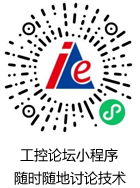OPC TO CREATE DATA EXCHANGE STANDARD FOR ETHERNET 点击:1200 | 回复:4
发表于:2002-03-09 19:11:00
楼主
OPC TO CREATE DATA EXCHANGE STANDARD FOR ETHERNET
The OPC Foundation today announced development of an OPC Data Exchange (DX) standard for Ethernet. ControlNet International, Fieldbus Foundation, Open DeviceNet Vendor Association and PROFIBUS International have agreed to support the OPC working group that will produce the DX specification.
"Automation market developments have resulted in multiple communication protocols that do not communicate," said David Bauman, Technology Leader, Corporate Engineering, at Procter and Gamble. "Automation systems that we have been designing and developing over the last several years require the exchange of data between and among systems using different protocols. With the OPC Foundation expanding its scope to develop a standard for exchanging data between Ethernet based communication protocols, end users will be provided with a simple solution to a real world need."
The OPC DX standard will provide interoperable data exchange and server-to-server communications across Ethernet networks. It is an extension of the existing OPC data access specification - backed by a majority of todays leading automation suppliers - which provides interchange of HMI and controller data. The OPC DX standard extends this data sharing exchange during run-time, independent of the real-time application protocol that is being used.
Tom Burke, president of the OPC Foundation, explained that reaching an agreement with the leading fieldbus organizations to extend the OPC data access specification was crucial. Multi-organization support will ensure broad acceptance of this standard. "OPC was the obvious choice for Ethernet data exchange because many automation companies already utilize OPC standards," Burke said.
"These standards provide a way to create plug-and-play software components from different automation suppliers that easily integrate into corporate-wide automation and business systems."
The DX standard complements the parallel efforts of OPC to provide tighter links to the enterprise and MRP systems and facilitate the availability of data business-wide. "We want to be able to move data anywhere and anytime independent of the underlying communication technology", Burke said. The creation of the OPC DX specification is key to that end. The OPC DX standard will leverage commercially available technology as the basis for the extension.
The first step, to establish the working group and gain commitment of leading fieldbus organizations is complete. The specification and sample code will be available in December 2001. The extension of the existing OPC standards will not impact the specifications of the networking organizations. Prototypes from multiple vendors will be demonstrated in April 2002 at the Hannover Fair in Germany as well as other key tradeshows globally.
The OPC Foundation is an independent, non-profit organization comprised of leading manufacturers and solution providers in factory and process automation. The OPC Foundations charter is to develop a worldwide industry-standard specification for multi-vendor interoperability in the manufacturing and process industries by leveraging open computing technologies.
For more information, contact: Don Holley, OPC Foundation Marketing Director, Tel: 1-512-683-5581, don.holley@ni.com
www.opcfoundation.org
Frequently asked questions about OPC Data Exchange
Q: What is OPC Data Exchange (OPC-DX)?
A: OPC Data Exchange (DX) defines an industry-standard set of interfaces that provide interoperable data exchange and server-to-server communications across Ethernet networks. It is an extension of the existing OPC data access specification. The OPC DX standard extends data access to enable server-to-server data exchange during run-time, independent of the real-time application protocol that may be supported by the Ethernet TCP/IP networks. The OPC DX specification defines a set of interfaces that can be used to remotely confi
热门招聘
相关主题
- TJA1050无法实现低速收发?
 [1628]
[1628] - thanks a lot :吴志扬
 [1377]
[1377] - SERCOS总线通讯原理
 [5134]
[5134] - 关于profibus开发的几点疑问
 [1530]
[1530] - 什么情况下can会出现stuff e...
 [6620]
[6620] - 如何实现虚拟串口一对多
 [4164]
[4164] - 刚进可口可乐公司,内部全部是...
 [4538]
[4538] - 应用现场总线若干问题的思考
 [5839]
[5839] - 关于总线的速度
 [2214]
[2214] - Profibus-DP:串口读写
 [3209]
[3209]

官方公众号

智造工程师
-

 客服
客服

-

 小程序
小程序

-

 公众号
公众号

















 工控网智造工程师好文精选
工控网智造工程师好文精选
